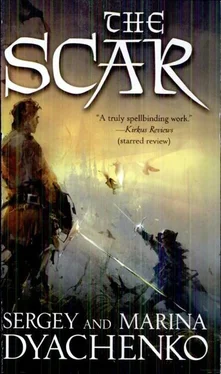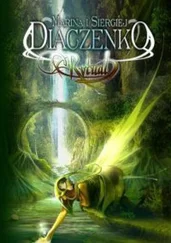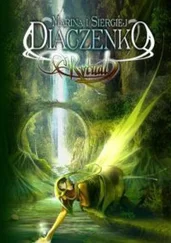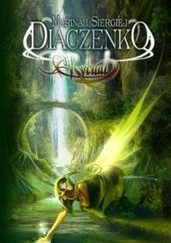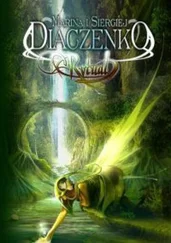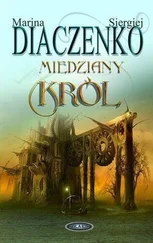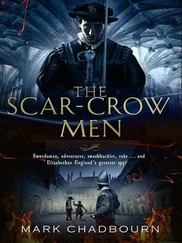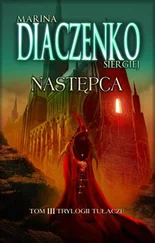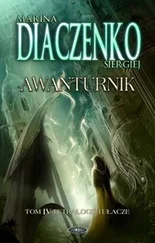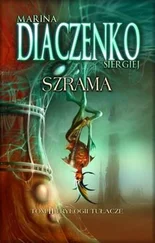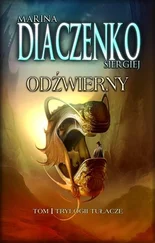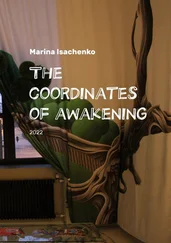However, right now it no longer mattered. Now they were all standing on the threshold of death, on the threshold beyond which Dinar had already stepped. She and Egert were a couple, even if they did not live to see their wedding, but her father was alone, alone in his study. If she feared, it was only for her father. Have I forsaken him for the sake of my own happiness? Could it be true that I have abandoned him? Could it be true?
Toria began to cry again. Egert kissed her glistening eyes and mumbled something tender; she could not make out a single word of what he said, and that was good: words were unnecessary.
Then she fell into a deep sleep and dreamed of a green mountain.
The mountain was covered with short, smooth grass. She hovered over it, occupying half the sky, and the second half was a deep blue. Toria recalled that the windows of their home were painted with this blue. The mountain was an emerald on blue. Toria inhaled, ascending even higher, and it was a good thing she did because there, on the summit of the mountain, stood her mother, wearing a dazzlingly white head scarf, laughing and stretching out her palms, which held a scarlet handful of strawberries, the first strawberries, and how long will it be until this winter is ended? There is still half a year until the next strawberries, there is still half a year, there is still time …
She awoke because Egert, groaning in his sleep, had firmly squeezed her shoulder.
* * *
They slept in the predawn hour; they both slept peacefully, deeply, without dreams, and therefore could not hear how, scraping softly, the door of the dean’s study opened, the door that had for many days been locked from the inside. In the recesses of the dark room the last flames of the candles were dying down, and the unbearably stuffy, smoky, thick air rushed to freedom. Books lay on the desk, on the floor, on all the shelves: laid bare, spread out, helpless as jellyfish driven to shore. The taxidermied rat shackled to its chain grinned evilly, the glass globe with the candle inside was covered with dust, but the steel wing spread out just as confidently and potently, and underneath it on the dean’s desk gleamed the faultless gold of the Amulet of the Prophet.
The dean stood for a long time in the doorway, leaning against the doorjamb. Then he straightened up and firmly closed the door behind himself.
The corridors of the university were familiar to him down to the last crack in the arched ceilings. He walked and listened to the sound of his own footsteps, rushing through the empty passageways. He stopped in front of his daughter’s room, pressing his cheek to the heavy door.
For the time being they were happy. The dean did not need to open the door to see the hazy morning light pouring over two heads on one pillow; the entwined arms, hair, knees, and thighs; the entwined breath, dreams, and fate. It seemed that there, in that room, a single blissful, calm, weary creature, who knew nothing of death, slept sweetly.
The dean absentmindedly stroked the door. The ancient wood seemed warm, like the skin of a living organism. He stood there for a bit longer, not wanting to intrude on their bliss, and then Luayan walked on.
He could not count the number of times he had walked out onto the university steps and paused between the iron snake, the incarnation of wisdom, and the wooden monkey that symbolized the thirst for knowledge. Ravaged corpses now met the dawn on the formerly busy square, above them the abode of Lash towered, like a curse, grimy with smoke, and the university behind the dean held its peace, strangely defenseless before the gaze of the Tower.
The Plague would devastate the earth if it was not stopped. Luayan had been fourteen years old when Lart Legiar appeared in his deserted home. Lart was at the peak of his power; Luayan knew much about him, but there was only one thing he wanted to ask: Is it true that you stopped the pestilence?
Decades ago the Black Plague had devoured entire cities far from the coast, but the sea had overflowed its shores from all the corpses that congested it. Luayan had an indistinct memory of spurts of flame scurrying across the faces of motionless people; a palm covering his eyes; the weight of sackcloth, flung over his head and shoulders; and a distant howl, not of a wolf, but of a woman. The Plague had deprived Luayan of his home, of his parents, of his memories of the past. That Plague had spared him; breaking suddenly like rotten rope, it had spared him and, an orphan, he had set out on the road with a crowd of other orphans, and had wandered until either a merciful chance or cruel fate led him to the house of Orlan.
Later, he found out that the Plague never departs on its own. That time it had been stopped by an archmage called Lart Legiar.
Luayan raised his face to the gray, impenetrable sky. For his entire long life he had fallen short of greatness.
He looked back over his shoulder at the university, then at the Tower. He rubbed the bridge of his nose with his habitual gesture. Heaven, how strong he had seemed to himself at the age of fourteen, and how weak he had been in actual fact. His world had been so hot then, in the foothills, the sun had beat down so brightly, the stones had been so incandescent, and the weather-beaten face of Orlan had been so obscure.
Wet snow, fine as milled grain, started to fall.
The city had gone dumb with horror. It had been stunned. Those who were still living cowered in deep shelters, and only the dead no longer feared anything. Luayan walked by them without averting his eyes. A looted shop slammed its door, which was hanging from one hinge; its owner, long dead and therefore indifferent to the ruin, lay huddled in the doorway. He squinted up at the mage with a single, withered eye: a mass of maggots swarmed in place of the other. Luayan kept walking. In a wide entryway an urchin was swinging on a swing; two sections of thick rope were attached to an overhead gantry. The boy held on to them with his hands, pumping his legs with abandon, accompanying himself with indistinct muttering, first flying into the darkness of the deserted house then flying out, passing over a dead woman in a black dress who was staring up at the sky. A rabbit hutch stood nearby and a rabbit, alive and starving, followed Luayan with its gaze. The boy did not even so much as glance at Luayan as he walked by.
The closer he came to the city gates, the more often he came across burnt-out and half-burnt-out houses. Black as if they were dressed in mourning, they gazed at Luayan with the rectangles of their windows, and on one sill he saw a sooty flowerpot with dead twigs hunkered over.
The stench of smoke and decay pulled at him from every side. He walked, stepping over bodies, swerving around capsized carriages, bundles of collected belongings, piles of purses, and the corpses of animals. The water of a narrow canal had acquired a thin film of ice overnight, and through the ice a yellow, lipless face stared up at Luayan from the bottom.
Sometimes darting, living eyes peered out of dark recesses at the sound of his footsteps and then immediately disappeared. Luayan never managed to meet these gazes. But the dead did not shield their eyes, and he honorably looked back at them, not once averting his eyes, as if he knew neither fear nor revulsion.
Lart Legiar was an archmage. Orlan was an archmage. But he, Luayan, was nothing more than a scholar; he was weak, heavens, how weak he was.
He took the wrong road, got lost on familiar streets, and twice he returned to the same place. On a tin beard—the sign of a barber’s shop—swayed a lynched looter. A weathervane that had wrenched free of its socket screeched like a hacking cough.
Lart had invited him to study under his tutelage. The boy should have leapt toward that fate, but now he was gray, and he was old, irredeemably old.
Читать дальше
